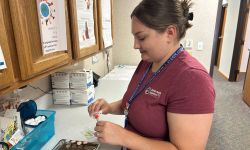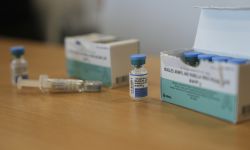FDA panel approves over-the-counter birth control, despite some concerns

- An FDA panel voted 17-0 Wednesday to approve the first oral birth control pill without a prescription.
- The pill, Opill, is made by a Michigan-founded business
- The FDA has not made a final ruling, however, and there is some concern about taking the pill without a doctor’s counsel
July 13: FDA approves first over-the-counter birth control, made by Grand Rapids firm
Birth control may soon be a lot more accessible across the country, and that is partly due to the work of a company founded in West Michigan.
Advisers to the U.S. Food and Drug Administration voted unanimously Wednesday to make the birth control pill, Opill, available without a prescription. If approved, it would become the first over-the-counter birth control medication in the U.S.
Opill is produced by Perrigo, a company founded more than 130 years ago in Allegan, Michigan, according to the company’s website. Its corporate headquarters is now in Dublin, Ireland.
Related:
- Michigan’s pitch to lure new residents: nature, high tech, abortion rights
- Michigan poised to ban employers from firing workers for having abortions
- Kalamazoo YWCA seeks tax dollars to support gender affirming, abortion care
It was not immediately clear when the FDA will issue a final decision; there were some reports Wednesday it will decide as soon as this summer.
There is also no guarantee the agency will approve the drug. Some FDA scientists raised questions about some data produced by the company and about whether patients could be relied upon to follow the medication’s rigid instructions without a physician’s guidance.
Allowing sale of the drug without a prescription would make contraception dramatically more convenient, particularly for low-income women, those living in rural areas and those without ready access to transportation or child care.
Wednesday’s recommendation is “exciting” news and a “great public health measure,” especially for people with little or no income, those who don’t have a regular provider, and those who need more privacy in accessing birth control, said Dr. Sarah Wallett, chief medical operating officer at Planned Parenthood of Michigan.
Being able to walk into a pharmacy without needing a doctor’s prescription would help keep a person’s purchase off their insurance records — a factor that could be important to a person in a violent relationship, for example, or a teenager who doesn’t want their parents to know they are sexually active, Wallett said.
“And in some communities, there’s a lack of trust in the health care community,” she said. An over-the-counter drug allows people who may be reluctant to see a doctor to take steps on their own to prevent unwanted pregnancies, she said.
At an investor’s presentation in March, Perrigo said expanding access to the pill would create a “huge opportunity to enter the $3.7B daily oral contraceptive market.”
Opill’s safety has been established for decades. It was first approved for prescription in 1973 and marketed by Pfizer as Ovrette for more than 30 years.
But Opill is not advised for everyone seeking birth control. Some critics of making it available OTC raised concerns that women with certain medical conditions, including breast cancer, who are supposed to avoid Opill, would miss that warning if they did not get their doctor’s counsel first.
It’s also crucial that the pill be taken every day at precisely the same time to be most effective. Some F.D.A. analysts said they were worried that teens or people with limited literacy would not notice or closely follow package directions.
On Wednesday, two FDA panels -- the Nonprescription Drugs Advisory Committee and the Obstetrics, Reproductive and Urologic Drugs Advisory Committee, voted 17-0 that the benefits of easier access outweighed the risks, a long-awaited decision for some women and especially relevant as the nation battles over the future of reproductive rights.
One possible compromise could be that the pill be available without a prescription but kept behind the pharmacy counter. That would make it more likely that a customer would have a screening conversation with the pharmacist about how to best use the drug, said Farah Jalloul, director of professional development with the Michigan Pharmacists Association.
Placing birth control behind the counter would be akin to the rules of dispensing Sudafed, which was placed behind the counter because the ingredients in the drug can be used to make illicit drugs.
Pharmacists would be knowledgeable of the risks and could use screening questions to make sure the consumer is a candidate for the drug, she said.
“Having it behind the counter would allow us (the pharmacists) to be the last person to touch base with the patient,” she said.
The potential decision is part of a larger national conversation on reproductive rights that moved front-and-center last year after the U.S. Supreme Court overturned Roe v. Wade, which had established the right to abortion under the federal constitution, returning that question to individual states. Last year’s ruling also raised concerns about related reproductive rights, and created demand for greater access to birth control and the so-called abortion pill.
More than 3-in-4 women in a survey last year by the San Francisco-based nonprofit, KFF, said they supported over-the-counter access to birth control pills. In the survey of 4,088 women ages 18 to 49, 56 percent strongly favored OTC access, and an additional 21 percent said they somewhat favored it. Just 12 percent said they opposed it.
Among professional medical groups that support broader access to the pill are the American Medical Association, the American College of Obstetricians and Gynecologists and the American Academy of Family Physicians.
“The panel expresses confidence in the effectiveness, not only in the general population of females, but also in adolescent populations and those with limited literacy,” said Maria Coyle, chair of the FDA advisory committee, and a pharmacist and associate clinical professor at Ohio State University.
“The panel seems very comfortable with the limited number of risks from the medication itself.”
A second drug company, Cadence Health, has also been in discussions with the F.D.A. about applying for over-the-counter status for its birth control pill.
See what new members are saying about why they donated to Bridge Michigan:
- “In order for this information to be accurate and unbiased it must be underwritten by its readers, not by special interests.” - Larry S.
- “Not many other media sources report on the topics Bridge does.” - Susan B.
- “Your journalism is outstanding and rare these days.” - Mark S.
If you want to ensure the future of nonpartisan, nonprofit Michigan journalism, please become a member today. You, too, will be asked why you donated and maybe we'll feature your quote next time!








